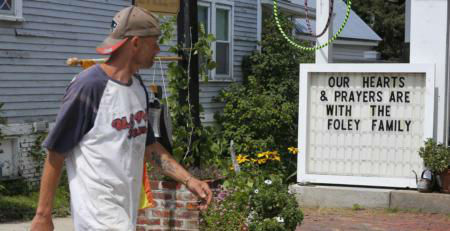Life story
Being a journalist isn't usually at the top of anyone's list of the most dangerous professions. Perhaps it should be. When reporters rush into explosive situations armed only with cameras and keyboards, they are certainly risking their own safety -- and sometimes even their lives. The kind of journalist who is willing to do this isn't naive or reckless. And, I suspect that the kind of reporter who flies into war zones or natural disasters doesn't do it just for the story alone. That kind of journalist does it for the people whose story it is.
What happened to James Foley is a tragedy. But it is also a tragedy to think that we are learning about the kind of person James Foley was only because he was murdered by terrorists. In the past week we have heard countless stories about Mr. Foley's life, his work, his family, and his faith. He was the oldest of five children, took a position with Teach for America, and spent 44 days in captivity with political prisoners in Libya. Foley later wrote about how he counted Hail Marys on his knuckles to get through that experience. Fellow prisoners recount his generosity even under the stress and abuse of those conditions.
James Foley could have settled back home in New Hampshire, and written a gripping and successful book about his experience. Instead, he chose to return to the Middle East, ultimately gave his life to expose the suffering of the Syrian people.
Mr. Foley may not qualify as a martyr in the strict sense of the word. But his life -- and not just his death -- provides a compelling witness. All people suffer. And when any of us pays attention long enough to want to do something about it, we run the risk of taking a beating ourselves. Most of us would consider such actions honorable, or even heroic. But more than admirable or courageous, James Foley's commitment to the people of Syria was Christ-like.
Very few of us will ever have or need the courage James Foley exhibited at the end of his life. All of us, though, are called to recognize that we are part of something much larger than just ourselves. Our faith teaches us that each of us is a child of God. That same faith also reveals to us that none of us is an only child.
There is something profoundly beautiful about life the way God made it and the way Christ redeemed it. The strange thing is that this beauty is often made visible by the most horrific events. Suffering is not without meaning. A person's death -- even when it seems violent and senseless -- does not have the last word. Life lived in service and from a heart that prays speaks more powerfully than the voices or deeds of those who seek to destroy it.
We do not need to travel to deserts on the other side of the world to find people whose suffering is worth reporting. Every day, right where we are, someone is struggling. Each and every one of those someones has the dignity that comes from being created by God and in his image. The biggest challenge most of us face to testifying about what we have seen is that we actually have to see it first. We can't tell stories from a distance. We've got to allow ourselves to get close enough to what is happening around us that something can begin to happen inside us.
That is how a story becomes ours to tell, and worth the telling. That is what James Foley did.
JAYMIE STUART WOLFE IS A WIFE AND MOTHER OF EIGHT CHILDREN, AND A DISCIPLE OF THE SPIRITUALITY OF ST. FRANCIS DE SALES. SHE IS AN INSPIRATIONAL AUTHOR, SPEAKER, MUSICIAN AND SERVES AS AN ASSOCIATE CHILDREN'S EDITOR AT PAULINE BOOKS AND MEDIA.
- Jaymie Stuart Wolfe is a Catholic convert, wife, and mother of eight. Inspired by the spirituality of St. Francis de Sales, she is an author, speaker, and musician, and serves as a senior editor at Ave Maria Press. Find Jaymie on Facebook or follow her on Twitter @YouFeedThem.



















